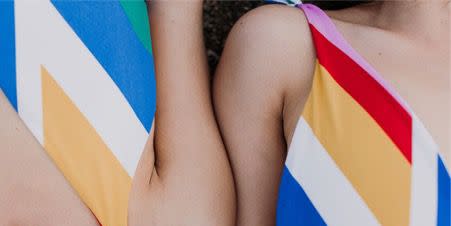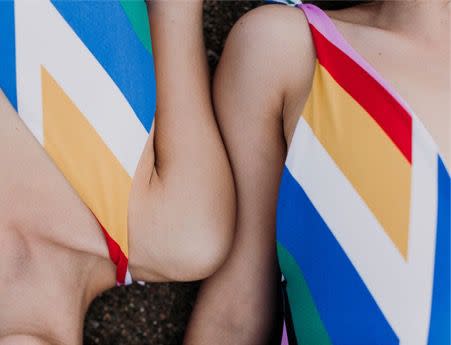Lisa Taddeo: 'I've Edited My Assaults In The Past - Society Is Not Yet Ready To Hear Them'

When I was 14, my parents and I took a trip to Puerto Rico. It was our first real spring break. It involved an aeroplane. Normally we would take road trips a few hours from where we lived in New Jersey, USA. But that spring my best friend had invited me to Florida with her family.
At first, my parents said yes, then they changed their minds. I cried violently for several hours until my father threw a slice of ham at my face. Then I cried some more. I hated ham with a passion, and the indignity – of both the action and the meat – was too much.
As a concession – for changing his mind, not for the ham – my father booked this trip to Puerto Rico. I packed a bikini, black with neon butterflies. Trying it on in my long mirror in my pink room, I felt like a woman. I felt formidable. We stayed at a hotel with a casino and each night I would play blackjack alongside my parents. I wore white sundresses and drank Coca-Cola that was far sweeter than any I’d drunk before.
I loved my parents, but I was put off by their looming presence. I wanted to be a sensual creature in the world. I had just seen My Father the Hero and I wanted to fall in love on a beach with a dark-haired boy who worked on boats. I wanted to kiss someone more than I wanted to keep breathing.
One afternoon, we lay on the beach by our hotel. My father was reading Stephen King and my mother was reading VC Andrews. They were smoking Marlboro Red 100s. The sun was so hot, everything glowed – the sand, my skin, my book – like it was on fire. I hated the smoke and loved the sun, so I told my parents I wanted to take a walk on the beach. They never let me out of their sight. I was rarely allowed to sleep over at a friend’s house.
But, that day, they said yes. I walked for so long, it felt like miles. I walked until there were no more hotels in sight. I laid down, just me in my bikini on the hot camel sand. I fell asleep there, alone and lulled by the heat and the slapping of the waves.
And then I woke up, an hour or so later, to a man licking my arm. He was in his 40s, in swimming trunks. I don’t remember much, except a moustache. I felt the rough hair on my arm more than I felt his tongue. It was the moustache, I think, that woke me. I sat up and he was startled but he didn’t run. He looked at me and eventually smiled. I looked around and there was nothing, nobody. I had gotten my way and found myself inexorably alone.
I said, ‘Excuse me.’ I got up, I smiled. I said, ‘Excuse me’, as though I’d interrupted him during a meeting. I said, ‘Excuse me’, as though I had burped in his face. I said, ‘Excuse me’, in a thousand different meanings, but not one of them meant, ‘Get the fuck off of me, you disgusting pig.’
I walked back to the spot where my parents were, feeling rusted. It took an hour. They were still there, smoking and reading, not angry at me for being gone for too long. I didn’t say anything – for one, because that would have been the end of my new small slice of freedom. The other, more terrible reason was because I was worried they would think I was a slut. I was a virgin, I’d never truly been kissed, and yet I worried my parents would think I was a slut.

That night, a vicious sunburn showed itself. My skin was a glossy boiled red and, over the redness, a membrane of water developed. I remember using a pin to prick it in various places. It wasn’t so much an act of self-harm as a novelty, this burn, of who I was underneath it. I promptly forgot about the entire episode for two decades. I remembered the sunburn and the casinos, but I don’t recall ever wearing the black bikini with the neon butterflies again.
When I began to write my book, Three Women, my hope was to take the pulse of our state of desire. After all, I had been enthralled with the notion of desire all my life. (Did it begin with that day in Puerto Rico? Who knows, but I imagine it was earlier.)
To find subjects – empathic ones with trenchant stories – I used every mode I could think of. I posted on Craigslist. I called editors and lawyers and therapists and police officers. I made posters looking for stories and taped them on university bulletin boards, on petrol station windows, at churches and hair salons and mechanic shops. I lingered in towns that seemed the ripest for intrigue.
I found the first woman for my book, Lina, after moving to Indiana and starting a women’s discussion group. Right away, Lina’s story spoke to me. The first reason I was so chemically drawn to her was because all she wanted was to kiss a man, deeply and for hours. And I remembered being 14 and wanting nothing more than that kiss.
A post shared by Lisa Taddeo (@lisadtaddeo) on Jun 20, 2019 at 6:03am PDT
The second was that she’d been gang-raped at a house party as a young woman. What was remarkable was the way that Lina, at 32, recounted it in our early conversations, which is to say: quickly and with little fanfare. She said that she did not contract a disease or get pregnant, so she was able to metabolise it as a difficult night, nothing more.
Shockingly, distressingly, I didn’t find it strange at first. But, as our conversations continued, she said that, if she were being honest, it was that night that stamped her as unworthy, in her mind, for the decades to come. It was during an exchange with Lina that the Puerto Rico episode fell from a recess of my brain. It landed with a thud and I looked at it all over again. I remembered the sensation of being licked by the man on the beach.
Slowly, I have remembered multiple moments like that one. Some not as odd or bad, some worse.
Once, at a concert I’d snuck into in New York City, a man began talking to me. He was 30 or so and asked how old I was. I told him the truth. ‘Fourteen,’ I said. ‘Well,’ he said, smiling like a wolf. ‘You know what they say – if there’s grass in the infield, you can play ball.’
Then there was the man I spoke to on the internet for a whole year when I was 12. I told him I was 18. He was 40, with children, living somewhere near Sherwood Forest. ‘My Robin Hood,’ I thought. He sent me audio files of his gorgeous voice. I lived in the fantasy between those files. Several months later, pictures followed. A man with a moustache, with a tired face, standing on a patch of gasping lawn.
Then there are all of the physical ones – the ways I’ve been pulled and prodded – the worst, for me, being when I could substantially remove myself from a situation, but did not.
One of the things that Lina said about the rape was that she didn’t want the boys to dislike her. I realised how many times I’ve felt the same. That I still do, when I’m talking to a man and he acknowledges my book, the women’s movement, then leans in close to say something slightly untoward. I realised that I have been conditioned to please, to speak to men on trains or planes when I would rather be reading or sleeping or sitting in silence.
The way that women bury our assaults – not even necessarily assaults, but the peculiar things that happen in our formative years – affects us greatly. I have edited my own assaults in the past because I’ve felt that society is not ready to hear them acutely named. Society is not ready for nuance.
Writing my book, researching the women, hearing from people who have read it, I’ve found that there are so many things that shape us. Some of those things are small, so very much under the skin, that they must be pricked to come out and, when that happens, there’s a loss, of course, of who we thought we were.
That hot day in Puerto Rico, that specific day did not change me. Neither did the night at the concert, where I danced as though I were on drugs when I had never had anything much stronger than a cigarette.
👂 👂 👂 #ThreeWomen available as audiobook from @SimonAudio on 7/9. To Pre-O:
Audible: https://t.co/Gwz6567Hji
Google Play: https://t.co/yrsn6aG2IJ- Lisa Taddeo (@lisadtaddeo) June 20, 2019
Where I did not stop talking to the thirty-something who’d made a reference so lewd that I pretended not to understand it. I laughed and drank from a bottle of beer and danced while he watched. It was not the day last month when a man emailed, asking if I wanted to skip dinner and fuck like rabbits. ‘Just kidding,’ he added, just above his signature.
It was not any of those days, but an accumulation. A thousand of those days that will have changed me. I wonder how I might have lived my life differently if I hadn’t been born under the male gaze. If there were one specific moment that sent me in a certain direction. But mostly I wonder if we can soon name our abuses, not just the ones that don’t disgust us or the ones where we had no agency, but the ones in which we did. The ones in which we played a part.
Or the ones that are the ugliest, that make us feel the worst. That make us feel like we went to a beach an innocent young girl and returned a tarnished woman. The scars from that day, and countless others, will never go away, but I’ve found a way to reframe them.
By talking about them, even the ones we think don’t matter, the ones that didn’t get us pregnant or give us a disease – by naming them and knowing that they are not who we are but what we have come from, and out of, and through – perhaps we can start to sit in the sun again, ignoring the person who wants to talk, who wants to comment on our books, our legs, our lack of smile.
And simply close our eyes, and shut out the noise.
Three Women by Lisa Taddeo is out 9 July. This essay original appeared in the August issue of ELLE UK, on sale now.
('You Might Also Like',)

